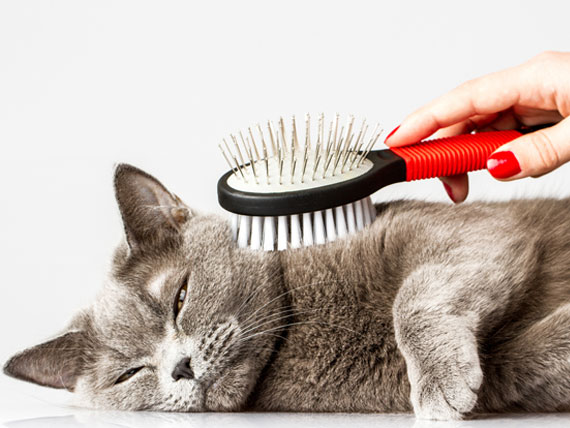Cat owners should make sure to visit the veterinarian at least once a year for an annual examination and shots. If a cat becomes sick or injured, it is advisable to visit the veterinarian or animal hospital immediately. Your kitten will need a series of vaccines when it is very young. This series of shots is commonly referred to as a 3 in 1". When your kitten is 2,3 and 4 months of age it will receive a combination vaccine that protects your cat from panleukopenia (also referred to as feline distemper), calicivirus and rhinotracheitis. If your cat has not been vaccinated and is four months or older, it will be necessary to administer a series of two vaccinations 2 to 3 weeks apart, followed up with annual vaccinations.
There are two immune system viruses (retroviruses) that can infect your cat or kitten; Feline leukemia virus (FeLV) and feline immunodeficiency virus (FIV). There is a vaccination available for feline leukemia but not FIV. It is possible that your cat can be infected and show no symptoms for months or years with either of these deadly viruses and the owner should make sure their cats are tested when visiting the veterinarian. Its mother can spread these viruses to a kitten at birth or through a bite of another infected cat. Outdoor and stray cats often carry these infections but neither is transmissible to humans. To ensure that your cat does not become infected with these viruses, it is advisable to keep them indoors. If you do allow your cat to be an outdoor cat, you must vaccinate the animal against the feline leukemia virus. No vaccine is 100% effective but it is an excellent preventative measure to safeguard your cat from ill health.
Aside from FeLV and FIV, there are some other ills that can befall your cuddly companion. Tiny parasites in the form of ear mites are a common problem that is easily transmitted between cats. You may notice your cat scratching its ears or shaking its head, which are two symptoms of ear mites. Take your cat to the vet if this occurs, he or she will clean the ears of your feline friend and administer proper medication. Worms are another problematic medical condition to look out for when caring for your cat or kitten.
Tapeworms and roundworms are common parasites that can infect your companion. Your vet can properly diagnose this nasty bug and prescribe medication to treat your cat. Fleas can transmit tapeworms as well as irritate your cat's skin. Check your cat weekly for fleas and ticks. Fleas are ubiquitous and will be all over your house if found on your cat and flea bombing your living space will be in order in addition to cat-safe flea shampoo or powder. Be sure to treat all domestic animals if you find one flea. Your vet can advise the best treatment program. Male and female cats can develop feline urological syndrome (FUS), which is an infection of the lower urinary tract. As in humans, if your cat is repeatedly visiting the litter box, you see blood in the urine or your cat is making loud cries or straining while urinating you must take your cat to the vet for medication. FUS is more common in male cats and this infection can be fatal if your cat does not receive rapid treatment.

 Cat Hairball Problems? Learn Why They Happen and How to Help
By Jennifer Coates, DVM
Ha
Cat Hairball Problems? Learn Why They Happen and How to Help
By Jennifer Coates, DVM
Ha
 Natural Ways to Manage Diabetes in Cats
By Aly Semigran
If your cat has been diagnosed wit
Natural Ways to Manage Diabetes in Cats
By Aly Semigran
If your cat has been diagnosed wit
 On the Road with Kitty
The very first rule of traveling with your cat is to have
On the Road with Kitty
The very first rule of traveling with your cat is to have
 Cat Scratching? Here's How Pet Food Can Help
You're probably tired of seei
Cat Scratching? Here's How Pet Food Can Help
You're probably tired of seei
 Should I Give My Cat Supplements?
By Ashley Gallagher, DVM
Vitamins and supplements
Should I Give My Cat Supplements?
By Ashley Gallagher, DVM
Vitamins and supplements